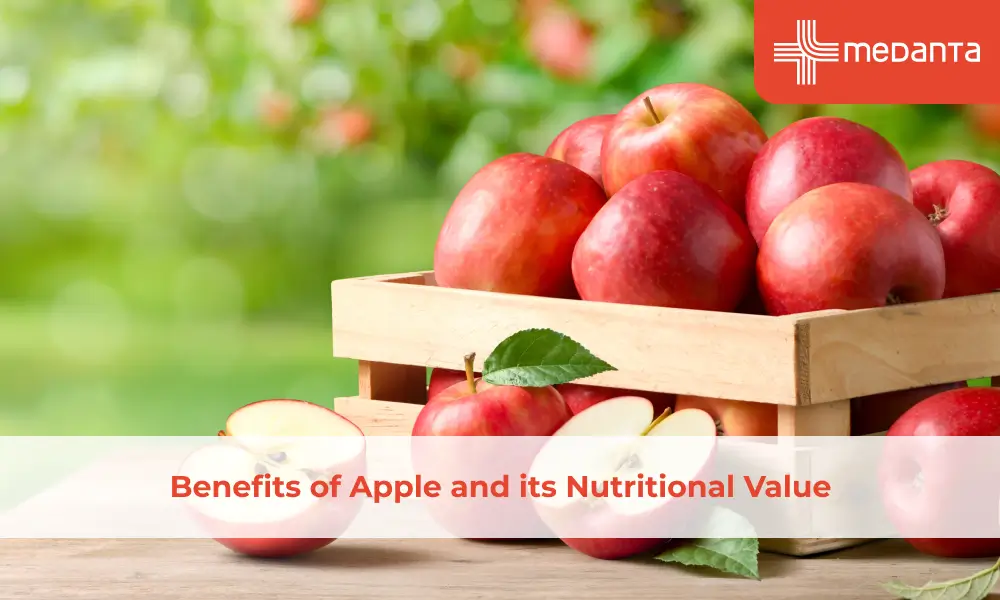Benefits of Apple and its Nutritional Value

TABLE OF CONTENTS
Apples are one of the most widely available fruits worldwide. These crunchy and juicy snacks offer amazing health and nutrition perks. A medium-sized apple has 95 calories and contains various nutrients that improve overall health. Apples' rich combination of fibre, vitamins, and antioxidants makes them more than just refreshing snacks.
Scientists have found that apples can lower your risk of several serious health conditions. People who keep taking them show reduced chances of heart disease. Studies suggest eating 100 to 150 grams daily supports your cardiovascular health. According to a study, the fruit might also decrease type 2 diabetes risk.
What is an Apple?
The apple (Malus domestica) has its roots in Central Asia. The apple's skin shows a base colour of yellow, green or yellow-green that blends with various shades from orange-red to purple-red. Most apples have pale yellowish-white flesh, though some varieties surprise us with pink, yellow, or green interiors.
Nutritional Value of an Apple
A medium sized apple (182g) gives:
Calories: 95 kcal
Carbohydrates: 25g including 19g natural sugars
Fibre: 4.8g
Water: 85%
Vitamins: Rich in vitamin C
Minerals: Rich in potassium
Antioxidants: Rich in quercetin, especially in the peel

9 Health Benefits of Apples
Here are some amazing benefits of apples:
Weight loss: Apples make you feel full because they contain lots of fibre and water. People who ate apples before meals felt more satisfied. Your BMI could drop if you keep taking them which helps with weight control.
Good for your heart: Eating 100-150g of apples each day helps lower your risk of heart disease. Your body's pectin binds to cholesterol in the gut and removes it. Daily apple consumption also reduced total cholesterol.
Lower chance of diabetes: People who ate more than one apple daily had a lower risk of Type 2 diabetes. Small changes made a difference - just one apple a day cut diabetes risk by 3%.
Promote gut health: The pectin in apples acts as a prebiotic fibre nourishing the beneficial bacteria in your gut. This helps create a balance between good bacteria types in your digestive system. Apple polyphenols also contribute to a healthier gut environment.
Help prevent cancer: Apples can lower your risk of lung, colorectal, breast, and digestive tract cancers. Eating at least one apple daily cuts colorectal cancer risk by a lot. Apple's polyphenols fight cancer by inhibiting the growth of cancer cells.
Help fight asthma: Quercetin, found in apple peels helps reduce inflammation associated with asthma.
Protect your brain: Your brain cells stay protected from oxidative stress thanks to apples' quercetin. Apple compounds help create new brain neurons that might boost learning and memory. Studies suggest that quercetin could help prevent Alzheimer's disease.
Improve mental health: People who eat fruits like apples often show fewer depression symptoms and better mental well-being.
Help with digestive diseases: Apples might lower your chances of getting gastroesophageal reflux disease (GERD). The fibre helps digestion and could ease constipation problems.
How to Include Apples in Your Diet
Apples make a delicious and simple addition to your daily meals. You can do much more with this nutritious fruit than just take a bite.
Your breakfast options are endless. Mix grated apple into pancake batter or top your oatmeal with diced apples, walnuts and cinnamon.
A smoothie with apples, Greek yoghurt and ginger gives you a fresh start to your day.
Apples add crunch and flavour to lunchtime salads. Mix apple slices with spinach, roasted sweet potatoes, and blue cheese to create a filling meal. The sweet-savoury combination works great in sandwiches too – apple slices elevate grilled cheese sandwiches perfectly.
Dinner becomes more interesting with apples. Sautéed apple slices complement desserts beautifully, and an apple-sweet potato casserole makes a hearty side dish. A carrot and apple soup brings balanced flavours to your plate.
Snack time brings creative possibilities. Slice some apples to make "apple doughnuts" with nut butter toppings. Apple nachos drizzled with caramel & chopped nuts taste amazing. Apple slices paired with yoghurt-peanut butter dip make a protein-rich treat.
The apple's peel has essential fibre that remains whole after cooking. Warm spices such as cinnamon help transform simple apple recipes into unforgettable dishes.
Conclusion
Apples are nature's perfect snack that pack impressive health benefits in every crisp bite. These humble fruits deliver strong nutritional value while staying low in calories, which makes them perfect if you have health goals. Their fibre content helps manage weight and their natural compounds boost heart health and might lower diabetes risk.
People of all ages can enjoy apples. Kids get immunity-boosting vitamin C, adults love the weight management benefits, and older people find their digestion improves. It also helps that apples fit easily into any meal plan. You can toss them into your morning smoothies, add them to your midday salads, serve them with dinner or just snack
on them to savour their sweetness. There's no need for pricey supplements or complicated eating plans when this everyday fruit offers you incredible health perks through simple enjoyment. That old saying about an apple a day keeping the doctor away might have some truth to it.
FAQs
How many calories are in an apple?
A medium-sized apple has between 95-104 calories. Different varieties and sizes change this number slightly. You can find small apples with just 80 calories, which makes them a great low-calorie snack.
What vitamins does an apple contain?
Apples pack these essential vitamins:
Vitamin C
Vitamins A and E
B vitamins including thiamin, riboflavin, niacin, B6, and folate
The apple's skin contains most nutrients, so eat them unpeeled to get the most benefits.
How much protein is in one apple?
Apples don't have much protein. You'll get about 0.5 grams from a medium apple. While they're not great for protein, apples are packed with other nutrients that help keep you healthy.
What are the health benefits of eating apples?
Eating apples regularly gives you many benefits:
Helps your heart by lowering cholesterol
Guards against chronic diseases
Vitamin C makes your immune system stronger
Contains antioxidants that fight damage in your body
Keeps your brain healthy
Are apples good for weight loss?
Yes! Apples help you manage weight in several ways. The fibre makes you feel full longer. Their low calories and high water content make them perfect for weight control.
Can apples help control blood sugar?
Apples have a low glycemic index (34-39), so they won't spike your blood sugar much. Their fibre, especially pectin, slows down sugar absorption. The polyphenols in apple skin can also help your body use insulin better.
How often should I eat apples for health benefits?
Eating 1-2 apples daily works best. Research shows eating one apple each day can lower your type 2 diabetes risk by a lot. If you want to lose weight, try eating two apples daily.
Do apples improve digestion?
Apple fibre really helps your digestive health. Pectin feeds the good bacteria in your gut. This helps you stay regular and prevents both constipation and diarrhoea.
Are green apples healthier than red apples?
Green apples have slightly more vitamins A, B, C, E and K than red ones. They also pack more fibre and less sugar. Red apples have more antioxidants though, so both types are good for you.
Can apples be part of a diabetic diet?
Apples are great for people with diabetes. The fibre in their skin helps slow down sugar absorption. Studies show that fructose (the main sugar in apples) causes lower blood sugar spikes after meals compared to glucose. You can safely add whole apples to your diabetic meal plans.






